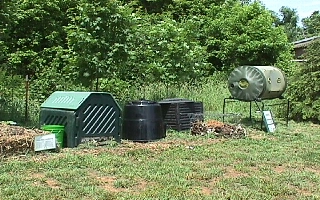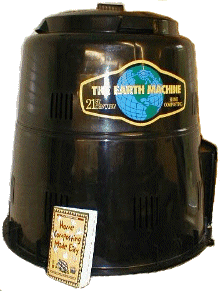| Click here for Composting Basics! |
Do you know how important composting is to Cape Elizabeth?
Cape's Recycling Committee has been talking about compost recently, and how important it is to all of us. Currently an estimated 15% of the waste stream is compostable kitchen scraps. Add to this the tons of yard waste generated every year and you have a lot of compostable materials.
Why do we compost?
In past years very little composting of yard waste and related materials was done. Much of the yard waste was taken to the dump and buried, and this often resulted in groundwater contamination and other runoff problems. Cape began to actively compost after rules were passed to prevent large scale burial or burning. There are many benefits to composting, whether done by the town or at home:
It produces a rich, beneficial soil additive
Less garbage goes into the hopper, and therefore we pay lower tipping fees to get rid of this garbage
More of earth's resources are conserved and recycled
We protect and improve our Cape environment.
 Home Composting
Home Composting
You can do a lot of composting right at home, saving the need to transport these materials to the transfer station. Yard waste is quite easy to compost - it can be as simple as a pile of grass clippings, leaves, and other yard waste out in your back yard.
You can buy or even build a small compost to hold the yard waste while it is breaking down. Wire mesh composting bins are versatile, inexpensive and easy to construct. Holding bins are a convenient way of composting yard wastes with little effort: Simply add wastes as they are cleaned up from the yard (if you have a lawn service, ask them to leave your clippings - they'll be happy to!). With no effort besides occasional moistening compost will be ready in 6 months to 2 years. Attention to chopping materials, maintaining moisture by watering and covering piles with plastic, and occasional turning will produce compost in less time.
 You can also compost food waste from your home. For this you will want a sturdy, enclosed compost bin to keep out skunks and other critters. the earth machineKitchen vegetable waste which can be composted includes vegetable and fruit scraps, egg shells, bread products, coffee grounds and tea leaves. Meat, bones, fats, and dairy products should not be composted. It may be helpful to keep a plastic container near the kitchen sink to collect scraps.
You can also compost food waste from your home. For this you will want a sturdy, enclosed compost bin to keep out skunks and other critters. the earth machineKitchen vegetable waste which can be composted includes vegetable and fruit scraps, egg shells, bread products, coffee grounds and tea leaves. Meat, bones, fats, and dairy products should not be composted. It may be helpful to keep a plastic container near the kitchen sink to collect scraps.

